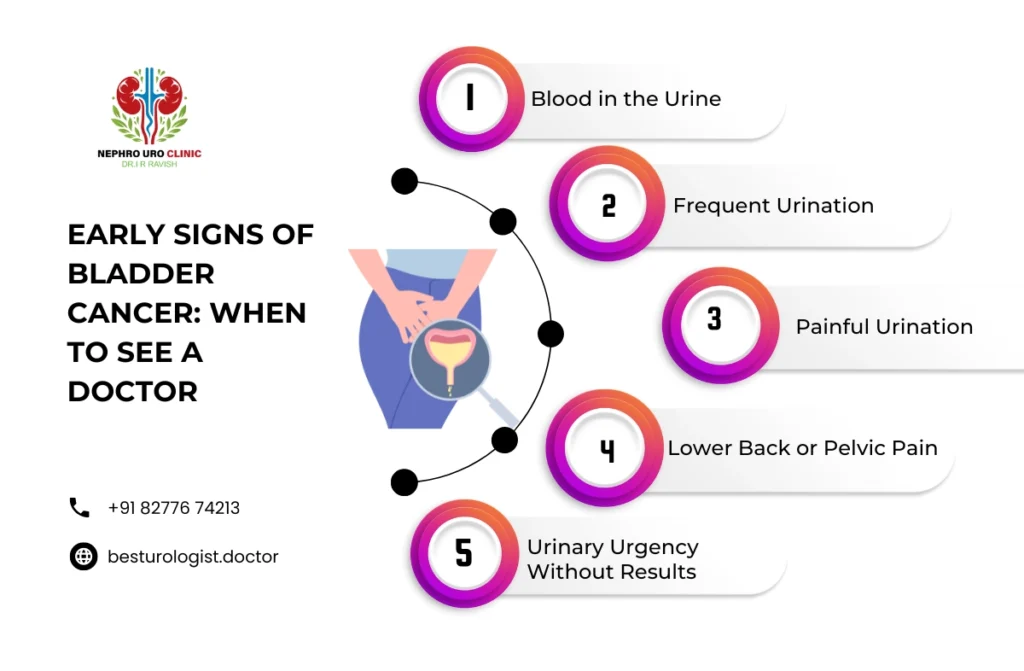Bladder cancer is a condition that affects the bladder’s lining, and it is one of the most common types of cancer in both men and bladder cancer in women. With the right information, early detection, and effective treatment, many patients can overcome bladder cancer and lead healthy lives. If you’re looking for bladder cancer treatment in Bangalore, it’s important to understand the symptoms, risk factors, and treatment options available.
Bladder cancer is a critical medical condition that demands expert care and timely treatment. Bangalore, a leading healthcare hub, offers world-class medical facilities and experienced specialists to tackle bladder cancer effectively. Whether you’re exploring bladder cancer treatment options or need tailored care, this guide delves into everything you need to know about bladder cancer treatment in Bangalore.
What is Bladder Cancer?
Bladder cancer begins in the bladder’s lining, the organ responsible for storing urine. It primarily occurs due to genetic mutations in the bladder cells, often triggered by environmental or lifestyle factors. Early diagnosis and treatment are crucial for successful recovery.

Types of Bladder Cancer
Bladder cancer is classified into different types based on its origin and severity:
- Transitional Cell Carcinoma (TCC): The most common type, originating in the urothelial cells lining the bladder.
- Squamous Cell Carcinoma: Linked to chronic irritation and infection, this type is more aggressive.
- Adenocarcinoma: A rare but serious form that develops in mucus-producing glands.
- Small Cell Carcinoma: A fast-growing cancer that requires aggressive treatment.
Understanding these types helps in determining the best course of bladder cancer treatment in Tilak Nagar or bladder cancer treatment in Jayanagar, depending on the severity and spread of the disease.
Diagnosis for Bladder Cancer
Early and accurate diagnosis is crucial for effective treatment. Common diagnostic methods include:
- Urinalysis: Detects blood or abnormal cells in the urine.
- Cystoscopy: A thin tube with a camera is inserted into the bladder to examine abnormalities.
- Biopsy: A tissue sample is taken during a cystoscopy for lab testing.
- Imaging Tests: CT scans, MRI, and ultrasound help visualize tumors and their spread.
If you are concerned about the cost of bladder cancer treatment in Bangalore, consult with specialists to understand the financial aspects, including insurance coverage and available treatment plans.
Risk Factors for Bladder Cancer
Several factors contribute to an increased risk of developing bladder cancer, including:
- Smoking: The leading cause of bladder cancer due to harmful chemicals in tobacco.
- Exposure to Chemicals: Industrial chemicals like arsenic and dyes can increase risk.
- Chronic Bladder Infections: Recurrent infections and inflammation may lead to cancer.
- Age and Gender: Older adults, particularly men, have a higher risk.
- Family History: A genetic predisposition can make individuals more susceptible.
Patients in Bangalore should explore both bladder cancer treatment in Tilak Nagar and bladder cancer treatment in Jayanagar for expert medical consultation.
Prevention and Early Detection
While not all cases of bladder cancer can be prevented, some measures can reduce the risk:
- Quit Smoking: The most effective way to lower the risk.
- Stay Hydrated: Drinking plenty of water helps flush out toxins.
- Healthy Diet: A balanced diet rich in fruits and vegetables can protect against cancer.
- Regular Screening: Especially for high-risk individuals, early detection leads to better treatment outcomes.
The cost of bladder cancer treatment in Bangalore varies based on factors like hospital facilities, type of treatment, and duration of care. Consulting with specialists can help you understand personalized treatment options.
Staging and Grading
Once bladder cancer is diagnosed, the next step is to determine its stage and grade, which helps guide the treatment plan. Staging refers to how far the cancer has spread, while grading indicates how aggressive the cancer cells are.
Stages
- Stage 0: Cancer is present only in the bladder’s inner lining and has not spread deeper.
- Stage I: Cancer has grown into the bladder wall’s inner layer but hasn’t spread to the muscle layer.
- Stage II: Cancer has spread into the muscle layer of the bladder.
- Stage III: Cancer has spread beyond the bladder to surrounding tissues or organs.
- Stage IV: Cancer has spread to distant parts of the body, such as the lungs or liver.
Grading
Bladder cancer is graded based on how the cancer cells look under a microscope:
- Low-grade: Cancer cells look more like normal bladder cells and tend to grow and spread more slowly.
- High-grade: Cancer cells look more abnormal and are likely to grow and spread quickly.
Knowing the stage and grade helps determine the best bladder cancer treatment options.
Treatment Options for Bladder Cancer
There are several bladder cancer treatment options available depending on the stage and grade of the disease. Treatment plans are often personalized to meet the patient’s specific needs.
Surgery
Surgery is a common treatment for bladder cancer, particularly in the early stages. There are different types of surgeries:
- Transurethral Resection of Bladder Tumor (TURBT): A minimally invasive procedure to remove tumors from the bladder.
- Cystectomy: The removal of part or all of the bladder. In cases where the bladder is entirely removed (radical cystectomy), reconstructive surgery may be required to create a new way to store and pass urine.
- Bladder-Sparing Surgery: In some cases, patients may qualify for surgeries that preserve part or all of the bladder, reducing the impact on urinary function.
Chemotherapy
Chemotherapy uses drugs to kill cancer cells. It may be used before surgery to shrink tumors or after surgery to kill remaining cancer cells. It’s also an option for advanced bladder cancer.
- Delivered before or after surgery to eliminate cancer cells.
- Intravesical chemotherapy targets the bladder directly.
Radiation Therapy
Radiation therapy uses high-energy beams to target and kill cancer cells. It is often used in combination with chemotherapy or as an alternative when surgery is not an option.
- High-energy beams are used to destroy cancer cells.
- Often combined with chemotherapy for maximum effect.
Immunotherapy
This treatment involves boosting the body’s immune system to fight cancer. Bacillus Calmette-Guerin (BCG) is a form of immunotherapy that is directly placed in the bladder to treat early-stage bladder cancer. Consulting with a specialist for bladder cancer treatment in Bangalore will help determine the most effective treatment plan for your condition.
- Boosts the immune system to fight cancer cells.
- Bacillus Calmette-Guerin (BCG) is a common intravesical therapy.
Which Tests Determine It Is Cancer?
Accurate testing is vital to diagnose bladder cancer in Bangalore. Common tests include:
- Urine Cytology: Examining urine samples for cancer cells.
- Cystoscopy: A camera-tipped tube inserted into the bladder to visualize abnormalities.
- Biopsy: Removing a tissue sample during cystoscopy for microscopic evaluation.
- Imaging Tests: CT scans, MRI, and ultrasound to detect the spread of cancer.
Early testing and expert analysis are essential for effective bladder cancer treatment options.
Risk Factors
Understanding the risk factors can help in early detection and prevention. Some common risk factors include:
- Smoking: Cigarette smoking is the leading cause of bladder cancer. The harmful chemicals in tobacco are excreted through the bladder, leading to cellular damage over time.
- Age and Gender: Bladder cancer is more common in people over the age of 55, and men are more likely to develop it than women.
- Chemical Exposure: Prolonged exposure to certain chemicals, especially in industries like manufacturing, can increase the risk of developing bladder cancer.
- Chronic Bladder Inflammation: Long-term bladder infections or inflammation can raise the risk of bladder cancer.
Knowing these risk factors can help you make lifestyle changes and seek early screening if necessary.
What Are the Complications Like?
Bladder cancer can lead to several complications, including:
- Cancer Recurrence: Even after treatment, bladder cancer has a high recurrence rate, making regular follow-ups essential.
- Metastasis: If left untreated, the cancer can spread to nearby lymph nodes, bones, and other organs.
- Urinary Dysfunction: Surgery or radiation therapy may affect bladder function, leading to incontinence or difficulty in urination.
- Treatment Side Effects: Chemotherapy and immunotherapy can cause fatigue, nausea, and a weakened immune system.
The key to managing these complications is choosing a reputed healthcare center offering advanced Bladder Cancer Treatment in Bangalore. Experts in Bladder Cancer Treatment in Tilak Nagar and other prime locations provide comprehensive care, including surgery, chemotherapy, radiation therapy, and immunotherapy to improve patient outcomes.
For those seeking expert medical guidance, consult the best urologists and oncologists specializing in Bladder Cancer Treatment in Bangalore to ensure effective and personalized treatment plans.
Life After Treatment
Life after bladder cancer treatment in Bangalore can involve several lifestyle changes and regular follow-up appointments to monitor your health. Patients who have undergone bladder-sparing surgeries may need to adjust to new urinary habits, while those who have had their bladders removed will require reconstructive surgery for urinary diversion.
Follow-up Care
Regular follow-up appointments are crucial for monitoring recurrence. These appointments may include cystoscopies, imaging tests, and urine tests.
Lifestyle Changes
- Healthy Diet: Eating a balanced diet can support recovery and improve overall health.
- Quitting Smoking: If you smoke, quitting is one of the most effective ways to reduce your risk of recurrence.
- Physical Activity: Regular exercise can help maintain your physical and emotional well-being after treatment.
Benefits of Bladder-Sparing Surgeries
Bladder-sparing surgeries offer patients the chance to treat their cancer while preserving bladder function. These surgeries are often combined with chemotherapy or radiation to eliminate cancer cells while maintaining quality of life. The benefits include:
- Improved Urinary Function: Retaining part of the bladder allows patients to urinate more normally.
- Lower Risk of Complications: Bladder-sparing surgeries are less invasive than radical cystectomy, resulting in quicker recovery times and fewer complications.
- Better Quality of Life: Many patients prefer bladder-sparing treatments to avoid the need for reconstructive urinary surgery.
For patients seeking bladder cancer treatment in Bangalore, bladder-sparing options may be available depending on the stage and type of cancer.
Conclusion
Bladder cancer is a serious condition, but with early detection, accurate diagnosis, and the right treatment plan, it is possible to manage and overcome the disease. From surgery to immunotherapy, there are multiple bladder cancer treatment options available, and consulting with a specialist will ensure you receive the best care for your specific situation.
For expert treatment and guidance, reach out to Dr. I. R. Ravish, a leading urology specialist with over 28 years of experience, providing world-class bladder cancer treatment in Bangalore.




